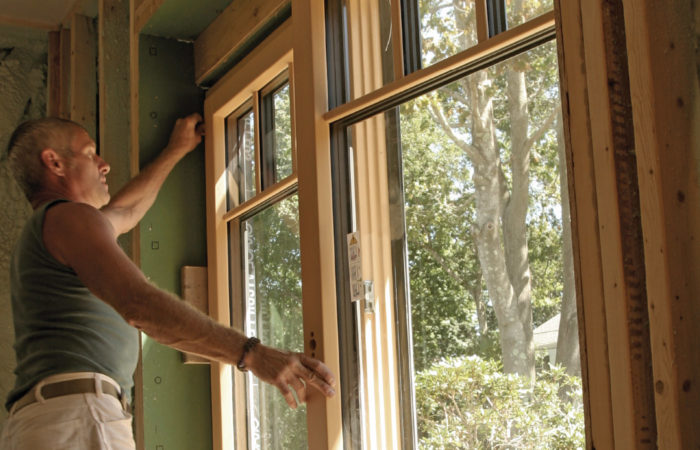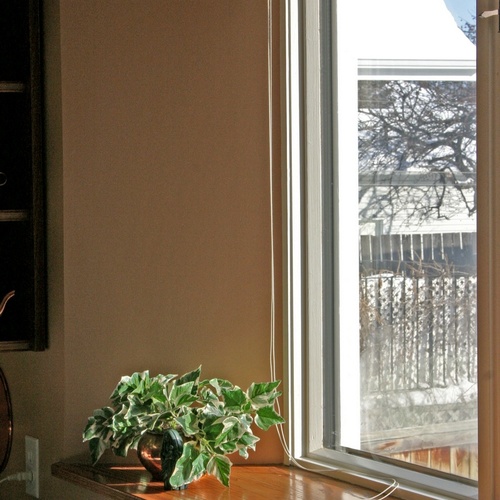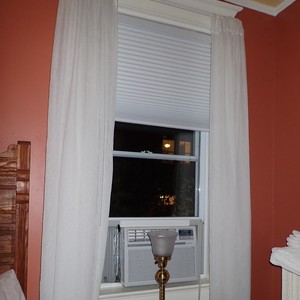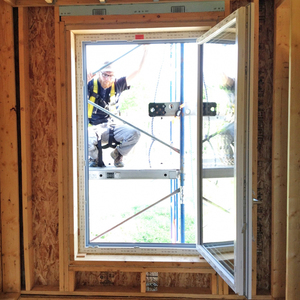
If you’re the owner of an older apartment building, how do you count the number of bedrooms in each apartment? Maybe you want to advertise that you have a three-bedroom apartment for rent—but one of the “bedrooms” is a windowless walk-in closet or pantry. Can you do that?
No, you can’t. According to Section R310 of the International Building Code (and most other building codes), every bedroom needs an operable window that can act as a second means of egress during an emergency—so landlords can’t count windowless rooms as bedrooms.
Egress window requirements
Here is a summary of IRC requirements for emergency egress windows:
At least one emergency egress window is required in any bedroom, any basement that has been turned into a habitable space, and any habitable attic.
To meet emergency egress requirements, a window:
- Needs to be operable (not fixed).
- When opened, needs to have an opening that begins no higher than 44 inches above the flooring.
- Needs to have an opening that is at least 20 inches wide.
- Needs to have an opening that is at least 24 inches high.
- Needs to have an opening that measures at least 5.7 square feet (unless the window is located on the ground floor, in which cast the minimum opening area is 5.0 square feet).
Note that a window that barely meets the minimum width and height requirements is not large enough to meet the minimum area requirement.
What about high-rise buildings?
If you’ve ever stayed on the 15th floor of a high-rise hotel, you’ve probably noticed that your bedroom window doesn’t open, for obvious safety reasons. It’s legal, in most cases, to omit an egress window in bedrooms in high-rise buildings—but only because the building includes fire-safety features (for example, sprinklers, fire alarm systems, and egress stairways) missing from…
Weekly Newsletter
Get building science and energy efficiency advice, plus special offers, in your inbox.

This article is only available to GBA Prime Members
Sign up for a free trial and get instant access to this article as well as GBA’s complete library of premium articles and construction details.
Start Free TrialAlready a member? Log in















36 Comments
I typically try and skip Airbnb if I can because of odd issues like this. Can be pretty hit or miss, particularly when you aren't getting the whole property. I'm not sure if VRBO has a better policy, it would be interesting to see if the same place is listed there. I'll pay a little extra for the consistency of a hotel. My favorite is the places that charge a large cleaning fee and then hit it with a vacuum cleaner at best when you leave. There are pretty good reasons that cities like New York ban Airbnb.
We once rented a place that had a pool, but they wanted $10 to clean the towels every time you used them. They did have a window in the bedroom at least.
There are many issues with AirBnB. Leaving a bad review with details is the best way to work within their system.
AirBnB is evil, full stop.
It's not just Air B&B. I have been seeing real estate advertisements for new units with three bedrooms, the smallest of which has no window, and will have gained approval by showing it as a family room or office. This is particularly pernicious, because that bedroom will most likely be occupied by children.
It probably takes an severe (casualty) incident with a guest and a lawsuit to get Airbnb to act on this. Too bad...
I’m not an attorney but I wouldn’t hold my breath waiting for AirBnb to be held responsible for this situation should a guest be harmed due to no egress (or any other code violation). A savvy owner of the unit would also probably hold their property in an LLC to distance or limit themselves from liability.
I haven’t done it, but sometimes I wonder if you need a safety kit for an abnb or vrbo (or some hotel) rentals that includes a CO monitor. (Why do I have such a bad headache?🤔🤔)
This is an important issue; the windowless bedroom is everywhere now. I have been in them with inadequate ventilation, claustrophobically small, and your point about safety just makes people’s eyes roll.
Pedantic question-- this question of glazing requirements comes up a bit it my projects. I don't see in section 310 where windows are required. I see 'openings' but not windows. I get lysdexic when I read the code, my glaze sort of eyes over.
@Lloyd-- this reminds me of your article on re-thinking window size. I'll speculate that you didn't mean 'no windows at all', but I do wonder out loud what the minimum limit on glazing (architecturally speaking) should be. I know many people (myself included) that sleep better in bedrooms with no windows, or with blackout curtains. Many of them are converted closets in their own homes, or in basements.
Here you go Luke,
2021 IRC Section R303.1 - Habitable rooms shall have an aggregate glazing area of not less than 8 percent of the floor area of such rooms.
Which is defined as: GLAZING AREA. The interior surface area of all glazed fenestration, including the area of sash, curbing or other framing elements, that enclose conditioned space. Includes the area of glazed fenestration assemblies in walls bounding conditioned basements.
indeed, but isn't there an exception for all rooms other than kitchens?
Luke,
Don't you still need an operable window as a means of egress from a bedroom? You do under our code.
that's exactly what code I'm asking for. the article references section R310, but I'm having a hard time finding it there. I see a requirement for an opening for egress, but not a requirement that the opening be a window. it's probably right there and I just can't see it.
Luke,
They are two different requirements. I don't think there is anything that says the second means of egress from bedrooms has to be a window, but unless there is a door to outside, windows are the only practical alternative.
In the IRC, section R310.1 exception 2 states that if the house has a sprinkler system, bedrooms in basement don't need emergency escape openings (which can be windows or doors of the right size). Otherwise there are no exceptions.
Ok then, I think you're confirming what I'm reading. It's hard to prove a negative after all...
My concern is all about whether or not a WINDOW is required, as the article states. Windows are expensive, but nice to have. I work on projects that, like many of us on the forum have already complained about, are highly glazed, and I often get asked how to make them more efficient in a cost effective manner. My first response is to reduce the glazing, which is infinitely cost-effective, but the response is like that Meatloaf song-- They'll Do Anything for [Efficiency], But They Won't do THAT. Occasionally I'll hear that we have to have lots of glazing for natural lighting and ventilation and egress since those are all unavoidably mandated by code. And I think we've observed here that the code simply doesn't say that in a plenary fashion. To wit-- there are many reasonable exceptions built in.
Reply to Luke, #16: emergency escape and rescue openings can be a window or door; the only real caveat is that they need to be operable using broadly understood methods (or wording to that effect). When you're trying to get out of a burning house and can't see, breathe or think, it needs to be easy.
thank you Michael. in the spirit of understanding the premise of the article, I will then understand that when I read window, it is really opening that is meant, and not exclusively fenestration
Luke, yes, I'm surprised Martin used the term "window" when that's not what's in the IRC. The IRC uses the term "opening" when it comes to emergency escape and rescue openings or ventilation. As noted above, there are separate requirements for daylighting; for that, the IRC uses the term, "glazing." https://codes.iccsafe.org/content/IRC2021P1/chapter-3-building-planning#IRC2021P1_Pt03_Ch03_SecR310.1
Michael,
I'm sorry if my use of the terms "egress window" and "emergency egress window" were misleading. In the vast majority of U.S. homes, the requirement for an emergency egress opening in the bedroom is met by a window or windows.
If any ambiguity remains, let me state here that a door directly to the exterior (or, perhaps, some type of plywood hatch) will satisfy the code requirement for an emergency egress opening.
To reiterate: In almost all cases, residential designers and builders of low-rise residential builders meet this code requirement with a window.
Martin, I only mentioned that I was surprised because you are usually very precise with your language. While windows are certainly the most common way to provide emergency escape and rescue openings, I know of many examples of doors being used instead, including two projects I'm working on now: one is a basement space with small windows but a door to the exterior (and a stair to the main level); another is a main-level bedroom/flex room with a sliding glass door for egress.
Newly constructed basements are required to have an emergency escape and rescue opening which is more often than not, in my experience, a bulkhead door to the exterior. (Not just finished basements; any basement is now required to have two means of egress unless the space is only for mechanical equipment and not exceeding 200 sq.ft.--that was a lesson I learned the hard way!) I agree that they aren't as common as windows, but there's a reason the code says "openings" rather than "windows."
Thanks Michael and Martin,
We got to where I was hoping we would. Good insights and discussion.
Michael,
Oh the tangled webs we weave...
Complicating things even further is that under our code the boundary of a bedroom is defined by the presence of a door. So the required egress (window, door, hatch, teleport-pad) can be located in an adjoining walk-in closet or en-suite bathroom, as long as there is no door in between.
I'm not surprised they have mandated a second way out of basements. Up here in Canada basements often evolve into warrens of finished rooms where the family spends a lot of time. Many seem like absolute death-traps.
Thanks for the laugh. (comment #8)
I also love me a spoonerism, though some find it indicative of a wack of lit.
here it is: Exception 3 to R303.1 The glazed areas need not be installed in rooms where Exception 1 is satisfied and artificial light is provided that is capable of producing an average illumination of 6 footcandles (65 lux) over the area of the room at a height of 30 inches (762 mm) above the floor level.
“2021 IRC Section R303.1 - Habitable rooms shall have an aggregate glazing area of not less than 8 percent of the floor area of such rooms.”
“Exception 3 to R303.1 The glazed areas need not be installed in rooms where Exception 1 is satisfied and artificial light is provided that is capable of producing an average illumination of 6 footcandles (65 lux) over the area of the room at a height of 30 inches (762 mm) above the floor level.”
Luke’s quoting of the exception above makes me wonder if susbstituting artificial light for glazing actually eliminates the need for a method of emergency egress, or just means that the egress method could be a windowless door, plywood hatch, etc. Hopefully, it is the latter.
Having survived a fire last year in which our two adolescent children had to escape through a bedroom window down an extension ladder about 5 minutes before giant flames poured out those windows, I take this matter seriously. Our kids were trapped in the bedroom by heat and smoke in the hallway and that smoke was blacker than night. Our home was destroyed and the first house we looked at renting was new and luxurious. One of the bedrooms had only wide windows perhaps 15” high and up near the ceiling. I often see these windows located below the high end of a shed roof. We quickly walked away from this rental.
While a window often serves both functions, the requirement for glazing with respect to lighting and the requirement for egress are separate requirements. Meeting an exception for one would not affect the requirement of the other.
The glazing requirement for daylight means that you don't need a window if you have the required amount of artificial light. While I agree that a bedroom with no views of daylight would not be a nice room, it would be code compliant as long as there is a means of egress and an emergency escape and rescue opening.
Here is a link to Elliott Advocacy's Airbnb executive contacts page. https://www.elliott.org/company-contacts/airbnb-customer-service-contacts/
I think this is worth bringing to the attention of the executives at Airbnb -- and perhaps the Elliott Advocacy group. They may be able to assist in getting Airbnb to take action on this negligent host.
Yamaguchi,
Thanks for the link. I just sent an email to Catherine Powell. If she responds, I'll let you know what she says.
Yamaguchi,
I never heard back from Catherine Powell, the person I emailed. But I just received a response from someone named Jordan. This is the message I received:
"My name is Jordan, and I am a senior manager from the executive escalations team. ... Thank you for your patience in this matter, we have finalized our investigation, and we have deactivated the Host's listing until the required changes are made based on our policy. We will not be able to refund you for this reservation unfortunately since you have completed your stay and also because this issue has not been reported at the beginning of your stay. We appreciate you bringing this to our attention."
Here's what I noticed about Jordan's response:
1. Jordan did not explain AirBnB's policy on windowless bedrooms. (I have asked a followup question on that issue. Jordan hasn't answered yet.)
2. Jordan did not explain which AirBnB policy was violated by the building owner.
3. Jordan did not tell me what changes the building owner is required to make.
4. Jordan told me I was not eligible for a refund, even though I never, at any point, requested a refund.
5. Jordan explained that the people at AirBnB "appreciate you bringing this to our attention," which is surprising, since my attempts to bring this to AirBnB's attention before I wrote an article, through two levels of customer service representatives, were essentially ignored.
Thank you for the update, Martin. It sounds like they at least addressed it, even if they are quite clumsy about it. I have run into this in the past as well when I was complaining about a hotel stay and did not ask for a refund yet they told me I can't get a refund. However, on another stay when I did ask for a partial refund for something, they completely ignored my emails.
Martin,
Perhaps their lack of interest was due to you not having an appropriately grand title. Perhaps GBA could appoint you Executive VP of Climate Response Escalation Team?
I just received one more response from AirBnB -- this time from someone who identifies herself as Diana, a senior case manager at Airbnb.
Diana wrote, "To answer your questions:
Q. 'Can you please tell me AirBnB's policy on windowless bedrooms?'
A. We require hosts to abide by their local laws and regulations, so the short answer is that it depends on the location. You can find more information in this article. There is also a link to our Responsible Hosting page in that article: https://www.airbnb.com/help/article/376
Q. ' Jordan did not explain which AirBnB policy was violated by the building owner.'
A. For privacy reasons, unfortunately we are unable to go into detail about [this] question. The listing is no longer viewable or bookable on Airbnb.
[The comments that follow were written by Martin.]
After hearing from four levels of customer service representatives at AirBnB -- namely Shanique, Bert, Jordan, and Diana -- here's what I noticed.
1. AirBnB isn't really concerned about safety, since Shanique and Bert blew me off.
2. AirBnB will continue to offer windowless bedrooms for rent, as long as the building owner ticks a box on an AirBnB form that confirms that "the building conforms to local code requirements."
3. Everyone at AirBnB is scared to death I might want a refund. AirBnB doesn't want to give refunds -- something I never asked for.
4. Action to improve safety did not happen when AirBnB was notified of a safety concern. Action only occurred when there was a public relations worry -- that is, my published article, which risked tarnishing the company's public image.
5. Since neither Jordan nor Diana expresses dissatisfaction with the way that Shanique and Bert handled my safety concerns, I can only assume that future AirBnb guests who report concerns about windowless bedrooms will be told that there is nothing that AirBnB can do to respond to their complaints -- unless the guest is a journalist who chooses to publish an article on this topic.
Martin,
At least a third of the houses in the town just up the coast from me are AirBnBs. Of those listings, more than 80% do not meet local bylaws precluding short term rentals when the owner is not present, and probably half have serious building code safety violations (non-listed wood stoves, and ladders to sleeping lofts being the most common).
The only thing that makes AirBnB address these or other issues is legislation or litigation. They don't care, and make a pretty perfunctory attempt of pretending they do
Airbnb is like most private businesses. They are not interested in their customer's well-being – only their pocketbook. I guess that unless there is an overly egregious violation resulting in mass casualties, they will probably ignore this issue. Or, as Martin points out, as a journalist that writes an article about it. Unfortunately, the GBA carries less clout than say..., the New York Times. But, that's just my opinion.
Log in or become a member to post a comment.
Sign up Log in